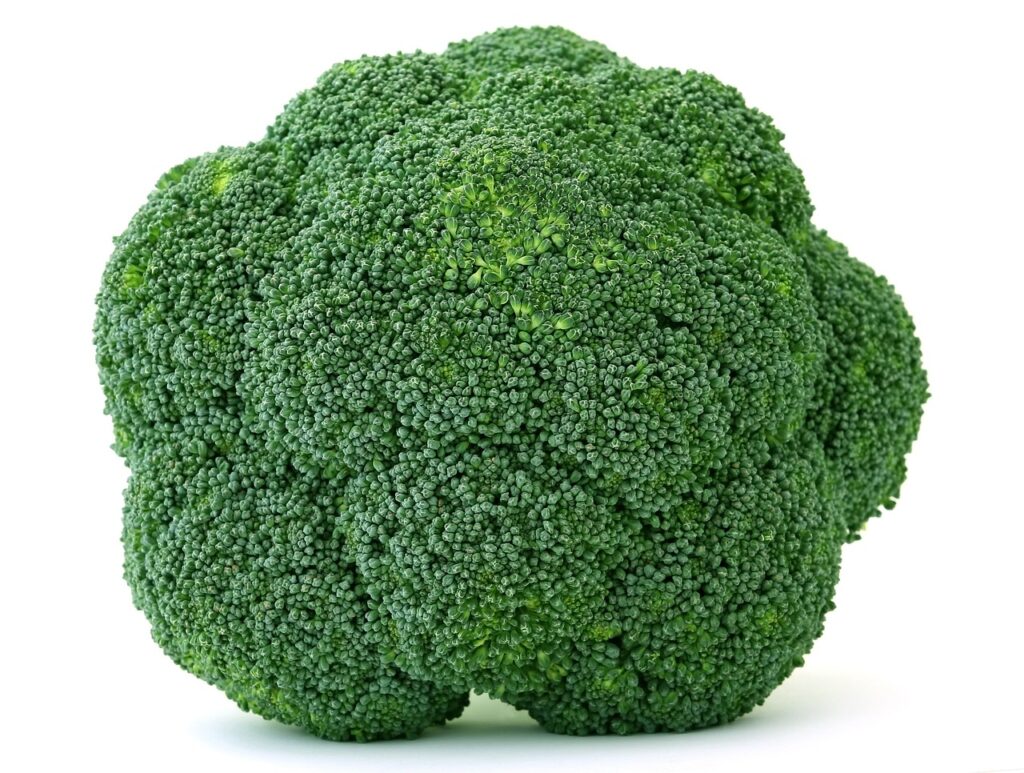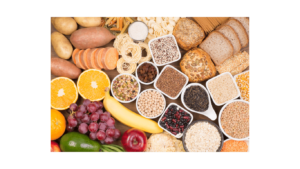Intro
In today's fast-paced world, maintaining optimal gut health is more important than ever. Your gut microbiome, the community of beneficial bacteria residing in your digestive system, plays a crucial role in everything from digestion to immune function. One of the best ways to nurture this microscopic ecosystem is by incorporating high-fiber foods into your diet. Dietary fiber serves as a prebiotic, feeding and fostering the growth of good bacteria. This post highlights five superfoods, packed with fiber, that can help supercharge your gut health and overall well-being.
Go Green with Broccoli

Broccoli stands out as a star in the vegetable kingdom, not only for its rich array of nutrients but also for its impressive contribution to gut health. As a cruciferous vegetable, broccoli brings more to the table than just fiber; it's loaded with a spectrum of vitamins and compounds that work synergistically to support overall wellness. A single cup of cooked broccoli offers approximately 5 grams of fiber, a significant portion of the daily recommended intake. This fiber plays a pivotal role in digestive health, ensuring smooth bowel movements and helping to maintain a balanced gut microbiome.
The benefits of broccoli extend far beyond just fiber. This green powerhouse is abundant in vitamin C, making it excellent for immunity, and vitamin K, crucial for bone health. It's also a good source of folate, a necessary nutrient for cell growth and metabolism. The presence of potent antioxidants like sulforaphane gives broccoli its anti-inflammatory properties, making it a formidable opponent against oxidative stress, which can harm cells and contribute to various health conditions.
Broccoli's role in regulating blood sugar is another notable advantage. The fiber content slows glucose absorption into the bloodstream, providing a more stable energy release and preventing spikes in blood sugar levels. This mechanism is particularly beneficial for individuals managing diabetes or those concerned about maintaining steady energy throughout the day.
What truly sets broccoli apart in the realm of gut health is its capacity to act as a prebiotic. The fiber in broccoli doesn't just aid in digestion; it also serves as food for beneficial bacteria in the gut. This nurturing effect helps ensure a healthy and diverse microbiome, which is crucial for everything from nutrient absorption to immune system modulation.
Moreover, broccoli's versatility in the kitchen makes it an easy addition to a variety of dishes. Whether it's steamed and seasoned as a side, incorporated into soups and casseroles, or tossed in a stir-fry, broccoli retains its nutritional value and adds a vibrant touch to meals. Its adaptability and mild flavor make it a favorite among both adults and children, helping families incorporate more fiber and nutrients into their diets seamlessly.
Broccoli's comprehensive nutritional profile and its contribution to a healthy gut microbiome highlight its importance in a balanced diet. By including broccoli in your meals, you not only support digestive health but also contribute to your body's overall function and well-being, underscoring the vegetable's value in a nutritious, health-forward lifestyle.
The Berry Best: Raspberries

Raspberries, those vibrant, sweet-yet-tart fruits, are a treasure trove of dietary fiber, offering a substantial 8 grams per cup. This high fiber content positions them as an indispensable ally for anyone looking to fortify their gut health. Beyond the immediate pleasure of their taste, raspberries serve a critical function in the digestive system, helping to regulate bowel movements and stave off constipation. The feeling of fullness they provide can also play a crucial role in weight management strategies, making them a wise choice for health-conscious individuals.
What sets raspberries apart, however, is not just their fiber content but also their rich assembly of vitamins, antioxidants, and anti-inflammatory properties. These elements collectively enhance the body's resilience against oxidative stress and inflammation, pillars of long-term health and disease prevention. The presence of these compounds makes raspberries a multifaceted addition to a diet aimed at not just gut health but overall vitality.
Delving deeper into their nutritional benefits, raspberries are also a source of vitamin C, manganese, and other essential micronutrients, which contribute to the maintenance of a strong immune system, healthy skin, and robust metabolism. Their low glycemic index means they can be enjoyed without causing significant spikes in blood sugar levels, an important consideration for maintaining steady energy throughout the day and for individuals managing diabetes.
Moreover, the role of raspberries in nurturing the gut microbiome cannot be overstated. The fiber in raspberries acts as a prebiotic, fueling the growth of beneficial bacteria in the gut. This symbiotic relationship supports not only digestive health but also the absorption of nutrients and the production of vital compounds, such as short-chain fatty acids, which have been linked to improved immune function and reduced inflammation.
Raspberries' versatility in culinary applications further enhances their appeal. Whether tossed into a morning oatmeal, blended into a smoothie, or simply enjoyed as a fresh, juicy snack, raspberries can easily be incorporated into daily eating habits. For those exploring creative ways to add more fiber to their diets without compromising on taste, raspberries offer a delightful solution.
In embracing the myriad benefits of raspberries, individuals take a proactive step towards enriching their diet with not just fiber but a host of nutrients essential for a thriving, healthy body. Their inclusion in a balanced diet is a testament to the power of whole foods in supporting not only gut health but holistic well-being.
The Mighty Legume: Lentils

Lentils, humble yet mighty, are a powerhouse when it comes to bolstering gut health through their abundant fiber content. This staple of many global cuisines shines not only for its affordability and versatility but also for its deep nutritional value. Packed with approximately 16 grams of fiber per cooked cup, lentils are a fundamental ally in promoting digestive well-being. Their rich fiber composition encourages the maintenance of regular bowel activity and helps in the prevention of constipation, a common concern that can impact overall quality of life.
Beyond their fiber prowess, lentils offer a remarkable profile of nutrients that contribute to their status as a superfood. They serve as an excellent source of plant-based protein, making them a critical component of vegetarian and vegan diets. This protein content supports muscle repair and growth, which is essential for overall body function. Moreover, lentils are rich in iron, a mineral vital for energy production and oxygen transport in the bloodstream, and folate, a B vitamin crucial for DNA synthesis and repair. Such a combination of nutrients makes lentils not only beneficial for gut health but for systemic wellness too.
One of the standout features of lentils is their role in cardiovascular health, attributed largely to their soluble fiber content. This type of fiber is known for its ability to bind to cholesterol particles and aid in their excretion from the body. Regular consumption of lentils can, therefore, assist in lowering harmful cholesterol levels, thereby reducing the risk of heart disease. Additionally, the soluble fiber in lentils plays a significant part in blood sugar management. By slowing down the absorption of sugar into the bloodstream, lentils can help stabilize blood glucose levels, an important factor for individuals managing diabetes or those mindful of their energy levels throughout the day.
The incorporation of lentils into daily meals offers a simple yet effective means of enriching one's diet with a nutrient-dense food that supports not only the gut microbiome but overall health as well. Their mild, earthy flavor and texture make them an excellent base for a variety of dishes, from hearty soups and stews to refreshing salads and side dishes. Lentils can effortlessly be included in meal planning, offering a convenient way to increase fiber intake while also enjoying the broad spectrum of nutritional benefits they bring.
The Ancient Grain: Quinoa

Quinoa, revered for centuries in South America as the "mother of all grains," stands out in the modern diet as a powerhouse of nutritional benefits, especially when it comes to gut health. This ancient grain's resurgence on the health food scene underscores its versatility and dense nutrient profile. With approximately 5 grams of fiber per cooked cup, quinoa not only meets a significant portion of daily fiber needs but also plays an essential role in maintaining digestive wellness. Its fibers serve as a banquet for beneficial gut bacteria, fostering a balanced microbiome essential for optimal health.
But the virtues of quinoa extend far beyond its fiber content. This grain distinguishes itself by being a complete protein, boasting all nine essential amino acids necessary for the body's repair and growth. This characteristic makes it an invaluable asset for vegetarians, vegans, and anyone seeking to increase their plant-based protein intake without resorting to animal products.
Quinoa's contribution to a healthy diet is further amplified by its rich supply of vitamins and minerals. It is a good source of magnesium, a mineral that plays a pivotal role in over 300 biochemical reactions in the body, including those involved in muscle and nerve function. Additionally, quinoa provides substantial amounts of phosphorus and manganese, minerals crucial for bone health and metabolism, respectively.
Another noteworthy attribute of quinoa is its status as a gluten-free grain, making it an excellent choice for those with gluten sensitivities or celiac disease. Its inclusion in a gluten-free diet ensures that individuals can enjoy a diverse range of nutrients without compromising their health or comfort.
The culinary versatility of quinoa is yet another reason for its popularity. Whether used as a base for a nourishing salad, a side dish to complement a variety of main courses, or even incorporated into breakfast bowls and baking recipes, quinoa's nutty flavor and pleasant texture make it a delightful addition to meals across the board.
By integrating quinoa into your diet, you're not only indulging in a delicious, ancient grain but also taking a proactive step towards supporting your gut health and overall well-being. Its combination of fiber, protein, vitamins, and minerals positions quinoa as a true superfood capable of enriching your dietary landscape in countless ways.
Fiber Rich Avocados

Avocados, often hailed as a superfood, bring a unique combination of healthy fats and fiber to the table, making them an essential component of any gut-friendly diet. Each serving of this creamy fruit provides a substantial amount of fiber, crucial for maintaining digestive health and ensuring regular bowel movements. But the benefits of avocados extend far beyond fiber.
They are packed with monounsaturated fats, known to support heart health and reduce the risk of heart disease. These fats also aid in the absorption of other fat-soluble vitamins, maximizing the nutritional value of meals. Moreover, avocados are rich in anti-inflammatory and antioxidant compounds, which combat oxidative stress and promote overall well-being.
Their nutrient-dense profile supports not just the gut microbiome but also bolsters the body's defenses against various ailments. Adding avocados to your diet can be as simple as spreading them on toast, tossing them into a salad, or blending them into smoothies. Their versatility and delicious taste, coupled with their health benefits, make avocados a must-have in any high-fiber, nutrient-rich diet.






